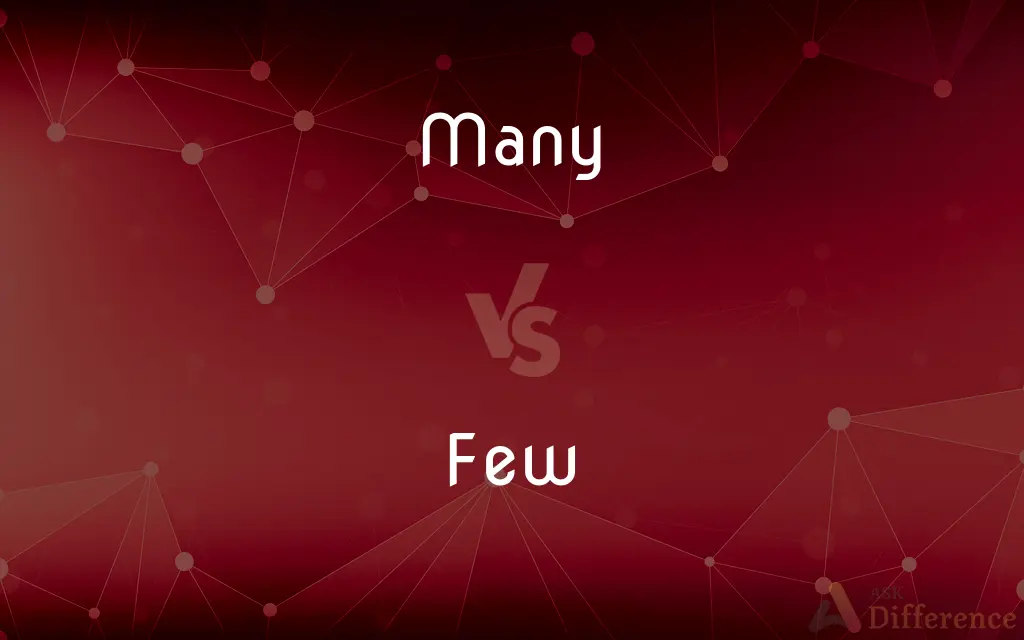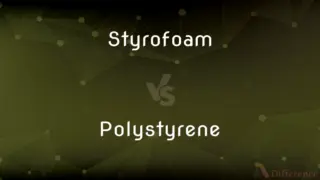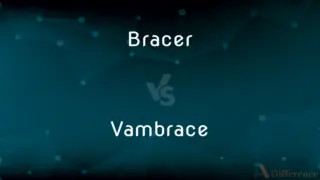Many vs. Few — What's the Difference?
By Tayyaba Rehman — Updated on October 26, 2023
Many refers to a large quantity, while Few indicates a limited quantity.

Difference Between Many and Few
Table of Contents
ADVERTISEMENT
Key Differences
Many refers to a large number or multitude of items, often suggesting abundance or a greater quantity. On the contrary, Few indicates a smaller number or limited amount, often pointing to scarcity or a lesser quantity.
When used to describe quantities, Many typically signifies an amount that is more than expected or than average. Few, on the other hand, often conveys an amount that is less than expected or average.
In contexts of comparison, Many can be used to highlight the larger group among two. For instance, when comparing two sets, the set with the higher number of items is said to have "many." Conversely, Few highlights the smaller group or suggests a lack.
Both Many and Few can be used in negative contexts to imply a deficiency or an abundance. For instance, saying "many mistakes" implies a high number of errors, while "few mistakes" suggests minimal errors were made.
While Many implies an almost overwhelming amount, where the exact number isn't the focal point but the abundance is, Few emphasizes the limited nature of the quantity, where the exact number might be small enough to be quickly counted or noticed.
ADVERTISEMENT
Comparison Chart
Definition
Refers to a large number or multitude.
Indicates a small number or limited amount.
Implication
More than average or expected.
Less than average or expected.
Usage
Used to highlight abundance.
Used to highlight scarcity or lack.
Negative Context
Implies a high number (e.g., many errors).
Implies a low number (e.g., few errors).
Precision
Suggests abundance without specifying exact number.
Emphasizes the limited nature, often countable.
Compare with Definitions
Many
Used to describe a large portion of a specific group or type.
Many of the students passed the exam.
Few
Not many but more than one.
A few apples were left on the table.
Many
A multitude, indicating abundance.
Many challenges lie ahead.
Few
A small number of.
Few people understand its complexity.
Many
Greater in number than the average or usual amount.
Many more cases were reported this year.
Few
Not as many as might be expected or wished for.
We have few resources to work with.
Many
Amounting to or consisting of a large indefinite number
Many friends.
Few
A limited number, especially in comparison to a larger group.
Only a few among them were chosen.
Many
Being one of a large indefinite number; numerous
Many a child.
Many another day.
Few
Amounting to or consisting of a small number
One of my few bad habits. See Usage Note at less.
Many
The majority of the people; the masses
"The many fail, the one succeeds" (Tennyson).
Few
Being more than one but indefinitely small in number
Bowled a few strings.
Many
A large indefinite number
A good many of the workers had the flu.
Few
An indefinitely small number of persons or things
A few of the books have torn jackets.
Many
An indefinite large number of.
Not many such people enjoyed playing chess.
There are very many different ways to cook a meal.
Few
An exclusive or limited number
The discerning few.
The fortunate few.
Many
(in combinations such as 'as many', 'so many', 'this many') Used to indicate, demonstrate or compare the number of people or things.
We don't need this many bananas. Put some back.
There may be as many as ten million species of insect.
I don't have as many friends as my sister does.
Few
(preceded by another determiner) An indefinite, but usually small, number of.
There are a few cars (=some, but a relatively small number) in the street.
Quite a few people (=a significant number) were pleasantly surprised.
I think he's had a few drinks. [This usage is likely ironic.]
Many
An indefinite large number of people or things.
Many are called, but few are chosen.
Few
(used alone) Not many; a small (in comparison with another number stated or implied) but somewhat indefinite number of.
There are very few people who understand quantum theory.
I was expecting a big crowd at the party, but very few people (=almost none) turned up.
Many
A multitude; a great aggregate; a mass of people; the generality; the common herd.
Democracy must balance the rights of the few against the will of the many.
Few
Obscuring one to two oktas (eighths) of the sky.
Tonight: A few clouds. Increasing cloudiness overnight.
NOAA definition of the term "few clouds": An official sky cover classification for aviation weather observations, descriptive of a sky cover of 1/8 to 2/8. This is applied only when obscuring phenomena aloft are present--that is, not when obscuring phenomena are surface-based, such as fog.
Many
A considerable number.
Few
(US?) Having a 10 percent chance of measurable precipitation (0.01 inch); used interchangeably with isolated.
Many
Existing in large number; numerous.
Few
Few people, few things.
Many are called, but few are chosen.
Many
A retinue of servants; a household.
Few
Not many; small, limited, or confined in number; - indicating a small portion of units or individuals constituting a whole; often, by ellipsis of a noun, a few people.
Few know and fewer care.
Many
The populace; the common people; the majority of people, or of a community.
After him the rascal many ran.
Few
An indefinite but relatively small number;
They bought a case of beer and drank a few
Many
A large or considerable number.
A many of our bodies shall no doubtFind native graves.
Seeing a great many in rich gowns.
It will be concluded by many that he lived like an honest man.
He is liable to a great many inconveniences.
Few
A small elite group;
It was designed for the discriminating few
Many
Consisting of a great number; numerous; not few.
Thou shalt be a father of many nations.
Not many wise men after the flesh, not many mighty, not many noble, are called.
Few
A quantifier that can be used with count nouns and is often preceded by `a'; a small but indefinite number;
A few weeks ago
A few more wagons than usual
An invalid's pleasures are few and far between
Few roses were still blooming
Few women have led troops in battle
Many
A quantifier that can be used with count nouns and is often preceded by `as' or `too' or `so' or `that'; amounting to a large but indefinite number;
Many temptations
The temptations are many
A good many
A great many
Many directions
Take as many apples as you like
Too many clouds to see
Never saw so many people
Few
Used to indicate scarcity or a lack.
Few options are left for us.
Many
A large number of persons or things.
Many people attended the concert.
Many
More than a few but not a lot.
He has many friends in the city.
Common Curiosities
Is "a few" the same as "few"?
Not exactly. "A few" is more positive, implying some; "few" can imply not as many as hoped for.
Do Many and Few always refer to countable items?
Mostly, as they typically refer to quantities of countable nouns.
Can "few" be used to indicate rarity?
Yes, Few can indicate something is not common or rare.
Why might someone use Few instead of giving an exact number?
Few provides a general idea without specifying, which can be useful in informal contexts.
Is "very few" more limited than "few"?
Yes, "very few" emphasizes an even smaller quantity.
Can Many ever indicate a small number?
No, Many inherently suggests a large number or abundance.
Does Few always imply a deficiency?
Not always, but it does indicate a smaller number or limited quantity.
How is "many a time" different from "many times"?
"Many a time" is an old-fashioned way of saying "often," while "many times" means "on numerous occasions."
Can Many be used with uncountable nouns?
Not typically. For uncountable nouns, "much" is often used.
Can Many and Few be used in negative sentences?
Yes, e.g., "Not many people came" or "Not few challenges lie ahead."
Are "many of" and "many" used interchangeably?
Not always. "Many of" is followed by an article or pronoun, as in "many of the students."
How do "the few" and "few" differ in usage?
"The few" refers to a specific small group, while "few" is more general.
Can Many and Few be used as nouns?
Yes, as in "The many outnumber the few."
Can Many be used to emphasize?
Yes, like in "thanks many times over."
Is "few and far between" related to the word "few"?
Yes, it's an idiom meaning rare or infrequent.
Share Your Discovery

Previous Comparison
Styrofoam vs. Polystyrene
Next Comparison
Bracer vs. VambraceAuthor Spotlight
Written by
Tayyaba RehmanTayyaba Rehman is a distinguished writer, currently serving as a primary contributor to askdifference.com. As a researcher in semantics and etymology, Tayyaba's passion for the complexity of languages and their distinctions has found a perfect home on the platform. Tayyaba delves into the intricacies of language, distinguishing between commonly confused words and phrases, thereby providing clarity for readers worldwide.














































